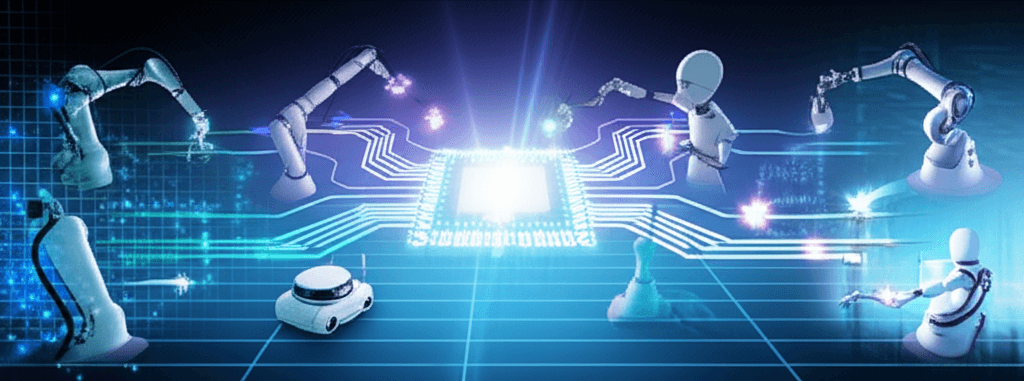Genesis AI Emerges with $105M to Pioneer Universal AI for Robotics
Genesis AI secures $105M to build a universal AI 'language' for robots, fusing simulated and real-world data.
July 3, 2025

In a significant move for the burgeoning field of physical artificial intelligence, robotics startup Genesis AI has emerged from stealth with a formidable $105 million in seed funding. The round, co-led by prominent venture capital firms Eclipse Ventures and Khosla Ventures, signals strong investor conviction in the company's ambitious goal: to create a universal, general-purpose AI model capable of powering a diverse range of robots across various tasks and environments.[1][2] This massive seed investment aims to tackle one of the most significant hurdles in robotics—moving beyond single-task, rigidly programmed machines to versatile, adaptable systems that can learn and interact with the physical world in a more human-like way.[1]
At the core of Genesis AI's strategy is a departure from the conventional methods of training robotic systems. While large language models (LLMs) are trained on vast datasets of text and code, AI for robotics requires data grounded in the complex physics of the real world.[3] Acquiring this physical data is notoriously expensive, time-consuming, and often impractical. To overcome this bottleneck, Genesis is pioneering a data-centric, full-stack approach.[4][5][6] The company has developed its own proprietary, high-fidelity physics simulation engine to generate massive quantities of synthetic data.[4][2] This in-house simulation stack, which originated from an academic project involving researchers from 18 universities, allows Genesis to create rich, varied datasets that mimic real-world interactions without the associated costs and risks.[1][2] The company claims this gives it a crucial advantage over competitors who may rely on third-party software, enabling faster model development and iteration.[3][2]
The company’s vision extends beyond just simulation. Genesis plans to unify this high-quality synthetic data with large-scale real-world robot data collection, creating a continuous, closed-loop system.[4][7][6] This dual-engine approach aims to bridge the gap between virtual training and real-world application, collecting a diverse and high-quality dataset to train its Robotics Foundation Model (RFM).[5][8] This multimodal generative model will be designed to understand and process information from various sources, such as vision and touch, and translate it into precise physical actions. The goal is to establish a universal "language" for robots, a foundational intelligence that allows them to perform a wide array of repetitive or complex tasks, from lab experiments and manufacturing to household chores.[1][3] This represents a paradigm shift from narrow AI solutions for specific functions to a more general and adaptable intelligence for machines.[1]
The substantial funding will accelerate Genesis AI's development efforts and expand its operations. With offices in both Silicon Valley and Paris, the company is tapping into global talent pools of experts in robotics, machine learning, and computer graphics.[1][4] The founders, CEO Zhou Xian, who holds a PhD in robotics from Carnegie Mellon University, and Théophile Gervet, a former research scientist at the French AI lab Mistral, bring a combination of deep academic expertise and experience at the cutting edge of AI.[2][9][8] The investment will be used to scale the company's synthetic data infrastructure and grow its team.[9] Genesis has also stated its intention to open-source components of its data engine and foundation model, a move aimed at empowering developers and accelerating progress across the entire field of physical AI.[4][7][8] An early version of the foundation model is planned for release to the broader robotics research community by the end of the year.[1][9]
The emergence of Genesis AI with such significant backing places it as a key contender in a competitive but potentially transformative market. The company is not alone in its pursuit of a general-purpose AI for robotics, with rivals like Physical Intelligence and Skild AI also attracting substantial investment.[1][2] However, the exceptionally large seed round for Genesis underscores strong investor confidence in its unique, full-stack approach that integrates simulation with real-world data.[1][7][6] Success in this domain could unlock the automation of a vast portion of physical labor, a market estimated to contribute trillions to the global GDP but which remains overwhelmingly unautomated.[7][5] By aiming to create the backbone for a new era of automation, Genesis AI is not just building robots; it's laying the groundwork for a future where intelligent machines can become adaptable partners in nearly every facet of the economy and daily life.[1][10]